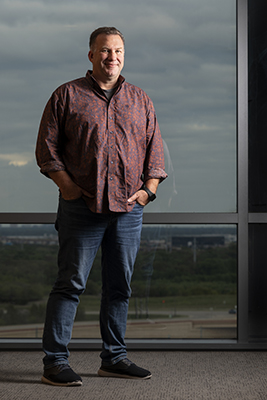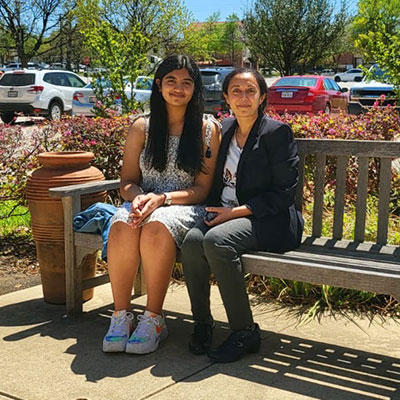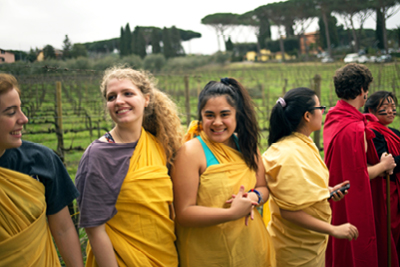You might not know FB Society, but if you call Dallas/Fort Worth home, chances are you know its brands or have dined in one of their locations: Whiskey Cake, The Ranch, Mexican Sugar, Sixty Vines and the Legacy Food Hall in Plano, among others.

Creating great dining experiences is something FB Society’s CEO, Jack Gibbons, MBA ’05, learned during his 25-year career with the Pappas Brothers, another successful restaurant group that operates nine restaurant brands, including Pappadeaux’s Seafood Kitchen.
But it was the mentorship he gained from University of Dallas professors while pursuing an MBA that gave him the confidence he needed to venture out on his own. We sat down with him to talk about his journey, what inspires him and where he sees the Dallas dining scene heading in the coming years.
FB Society represents some of the most recognized dining concepts in DFW — Whiskey
Cake, Mexican Sugar, Ida Claire and more. How was FB Society conceived and born?
It was born from a shared desire to change the hospitality business and dream a little
bigger than most! Randy DeWitt, our chairman, and I met while I was working in Houston
for the Pappas Group and began discussing our ideas, thoughts and hopes. Seventeen
years later we’ve traveled the world, dreamed lots of dreams and birthed more than
20 concepts together. We probably learned more from our failures than the successes
we’re most recognized for.
Growing up, did you ever imagine being an entrepreneur or in the restaurant business?
I could have never imagined doing what I do for a living. It’s really not “working”
at all. I get to work with incredibly talented and creative people, build experiences
that bring joy to people and make visions a reality on the daily. There is no way
I could have ever dreamed this would be my real life!
Where did you grow up, and how did you get into the restaurant business?
I grew up in Pennsylvania, then went to the University of Houston for my undergraduate
degree, where I majored in business. I didn’t really know what I wanted to do, and
was just trying to figure it out when I got a part-time job first as a waiter. It
was the early ’90s, and restaurants weren’t trying to necessarily get people with
degrees. But at Pappas, to become a general manager, you had to have a college degree
to move up. So I started as a waiter, and worked my way up to general manager. I ran
multiple Pappadeaux locations in Houston and helped grow that into Dallas and Chicago.
I spent 25 years there, so FB is the second job I’ve had.
What motivated you to pursue an MBA at the University of Dallas?
Learning with the Pappas was amazing. I had been working in a senior operations role
at Pappas for quite a while and felt it was time to invest in myself to grow beyond
the role I was in. The independent thinking that the University of Dallas is known
for was most attractive to me.
How would you describe your UD experience? What was the most valuable aspect of your
MBA program?
The professors had all been in the trenches. The program allowed me to gain perspective
necessary to help me shape my own career beyond operations. Hearing the professors
talk and reading about Peter Drucker and other inspiring people helped me think differently
about business. So I’d say it wasn’t one class or experience, but the whole well-rounded
education, from accounting and looking at P&Ls to marketing and learning about branding.
Your email signature includes a description of your “superpowers,” which sound like
a recipe for an entrepreneur — Ideation, Achievement, Maximizer, Competition, Command.
What advice would you give to aspiring entrepreneurs, particularly those in the food
and hospitality space?
Those are actually my top five strengths from Gallup’s Strengthsfinder program. We
took the time to assess each FB Society team member and learn their top five, which
allows us to leverage each other’s strengths and build diverse and dynamic teams.
As far as advice to aspiring entrepreneurs, I’d say two things: Dream bigger and be
prepared to work harder than you have ever imagined.
What are your “kryptonite” traits as a business leader/entrepreneur, and what can
others learn from those?
Falling in love with my own ideas is certainly kryptonite, not just for me, but any
entrepreneur. It’s critical to gather thoughts and opinions from a diverse group of
trusted partners before moving too far down any path.
COVID has decimated so many restaurants and small businesses. How have you, your partners
and your employees navigated through the pandemic?
We worked our ***** off. Honestly, I’ve begun to hate this question because my answer
is similar to what I share about success in general in the hospitality business. We
had to adapt quickly, identify how to translate each brand’s DNA into a to-go model,
and then find ways to best support our team and keep them employed. We hosted a daily
strategy session with our brand leaders and made fast, continual improvement daily.
From a finance side, we tightened our belts, became as savvy as possible about government plans, and then our CFO, Dan Lawler, worked to quickly ensure our businesses were first in line to leverage available funds. The collective efforts of our leaders and field teams ensured we survived, and the trust built among our leadership team is unmatched.
Do you have a role model, or role models, that shape your approach to business and
entrepreneurialism?
I have many. I really see every successful entrepreneur as a role model in some way.
I’m an avid learner and listen to podcasts, read articles and will always find time
for coffee or a Haywire “Jack style” [Haywire’s signature whiskey cocktail in which
agave replaces simple syrup] to hear someone’s story.
How has the Dallas food scene changed — for better or for worse — over the course
of your career?
I love the evolution of the Dallas food scene. We’ve abandoned the idea that “celebrity
chefs” are necessary to build high volume, over-the-top experiences, and I love the
way our dining scene is embracing emerging talent. Chef Skyler Gauthier, our culinary
executive at Haywire, is a prime example of the kind of talent we’ve begun to nurture
in Dallas.
We’ve also become a destination for bigger brands to thrive. They know Dallasites appreciate incredible hospitality, and they show up to support.
I’m proud of the way folks like Iris Midler [founder of the Chefs for Farmers Food & Wine Festival] have also created food experiences outside the confines of traditional restaurants and really encouraged exploration and discovery. Dallas is a place where you can color outside the lines and experiment — which suits FB Society brilliantly.
If you were a fortuneteller and could summarize the future of food in Dallas and the
Metroplex in three words, what words would you choose?
Global, boutique, automated.


